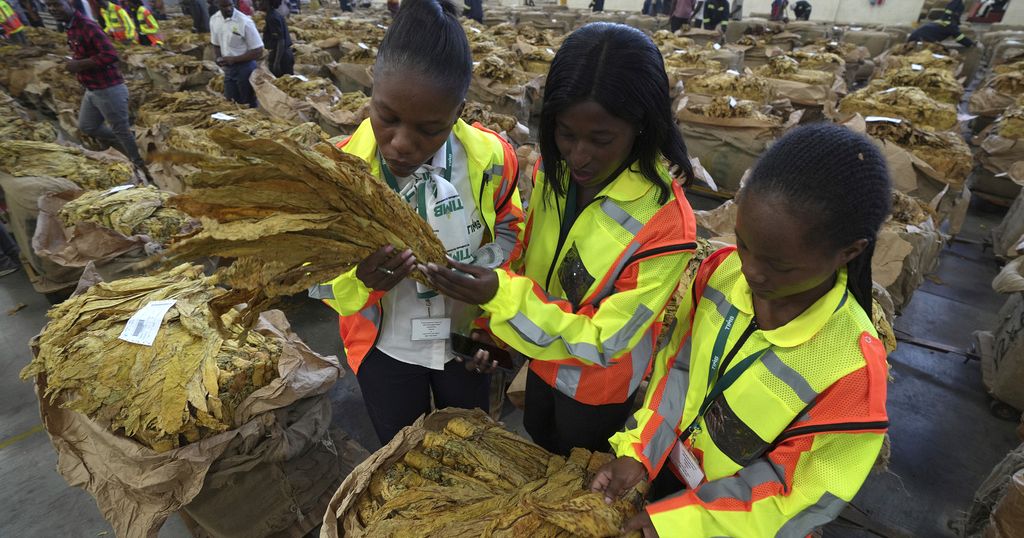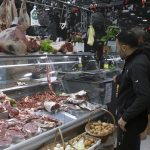Zimbabwe predicts a pointy decline in tobacco crop as El Niño takes toll


Zimbabwe, Africa’s largest tobacco producer, started its annual tobacco-selling season on Wednesday, with officers and farmers projecting a pointy decline in harvests and high quality due to a drought blamed on local weather change and worsened by the El Niño climate phenomenon.
From a report harvest of 296 million kilograms (326,000 tons) final 12 months, the nation is estimating that manufacturing will fall to about 235 million kilograms (259,000 tons) this season, mentioned Patrick Devenish, chairman of the Tobacco Industry Marketing Board, on the official opening occasion within the capital, Harare.
“Most of our tobacco is grown by small-scale farmers. They depend on the rains, and a drought is not good for their crop,” Devenish mentioned. “The quality of some of the tobacco may also be affected.”
He mentioned Zimbabwe sells the majority of its tobacco to China, though Western and Eastern Europe and elements of Africa stay essential markets. In 2023, it obtained a report $1.2 billion from tobacco exports, up from $975 million in 2022, in response to the TIMB. Tobacco is among the nation’s main international foreign money earners, together with minerals corresponding to gold.
Agriculture minister Anxious Masuka mentioned small-scale farmers, who lack gear and rely upon rain, produce about 75% of the crop. This makes the nation’s manufacturing susceptible to climate circumstances.
Like a few of its southern African neighbors, Zimbabwe is battling a devastating drought that support companies blame on El Niño and local weather change.
Tobacco manufacturing had been rebounding within the tiny African nation, after plummeting from about 240 million kilograms (265,000 tons) in 1998 to lower than 50 million kilograms (60,000 tons) a decade later following the eviction of a number of thousand white farmers who accounted for almost all of growers.
With final 12 months’s report harvest, Zimbabwe regained its spot as one of many world’s prime 10 exporters of tobacco, alongside mega producer China, India, Brazil, the United States and Indonesia.
China has been central to Zimbabwe’s tobacco increase by establishing a grower contract system run by the state-owned China National Tobacco Corp., the world’s largest cigarette producer. Under the system, the Chinese firm gives seeds, fertilizers, meals, and cash to pay for labor and wooden for curing the tobacco to Black farmers, who now make up the vast majority of Zimbabwe’s tobacco producers. The farmers, in alternate, are obligated to promote their crop to the Chinese firm or its brokers.
About 95% of Zimbabwe’s crop is financed by way of the contract system, which is now additionally supplied by some non-Chinese native and international firms. Farmers, a lot of whom are unable to get loans from banks as a result of a scarcity of collateral, say this financing system leaves them in a cycle of debt.
The nation had hoped to extend its harvest to 300 million kilograms (330,000 tons) by the tip of 2025 below a government-led tobacco transformation plan adopted in 2021.
But the drought has badly dented farmers’ optimism this season.
“The drought is likely to cost farmers 20% or more of their usual earnings,” mentioned George Seremwe, president of the Zimbabwe Tobacco Growers Association, which represents Black small-scale farmers.
Likephone Makii, a tobacco farmer from Madziwa, about 140 kilometers (90 miles) northwest of Harare, appeared on the value he obtained at public sale for one in all his bales, simply $1.70 a kilogram due to its poor high quality, and shook his head in dejection.
Makii, who has been rising tobacco for the final 9 years, mentioned he normally harvests 6,000-7,000 kilograms (6.6-7.7 tons) from his two-hectare (5-acre) plot, which depends on rainwater. He expects solely 3,000 kilograms (3.3 tons) this season.
“It has been the toughest season for me and my fellow small-scale farmers,” he mentioned.
Reliant solely on tobacco for survival, Makii predicted his household would want meals help to make it by way of the 12 months.
He will be part of tens of millions of others pressured to depend on meals support because the drought takes its toll on households that develop money crops corresponding to tobacco in addition to staple meals corresponding to maize, in response to support companies.











